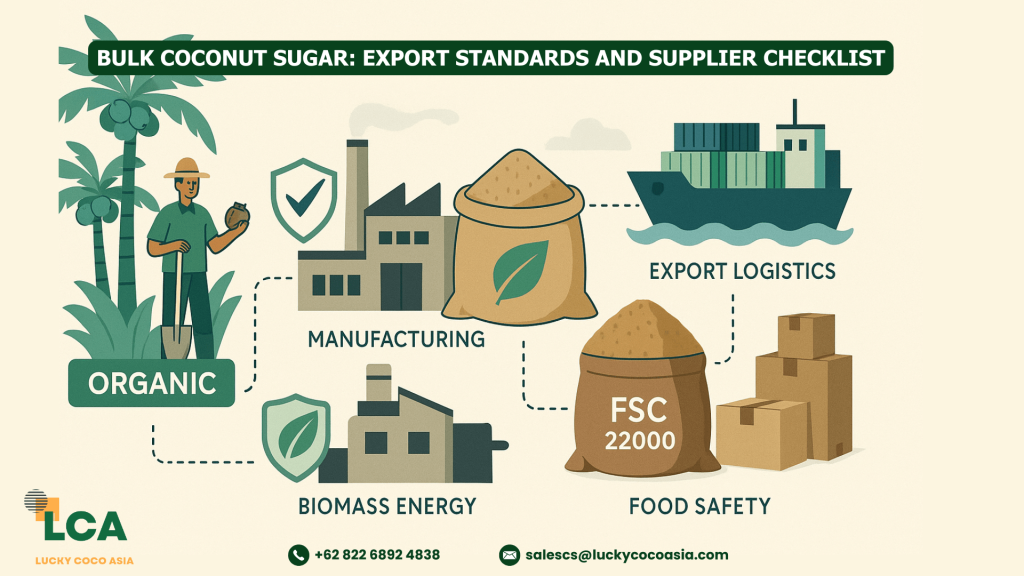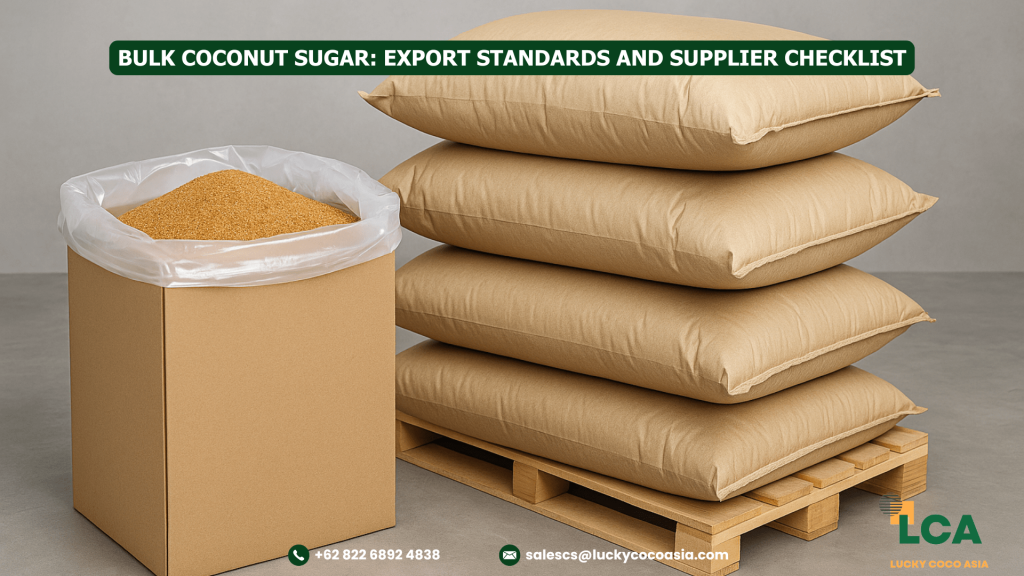Bulk Coconut Sugar Supplier – Export Standards & Checklist

Bulk Coconut Sugar Supplier – Export Standards & Checklist
In today’s global market, bulk coconut sugar has carved out a strong niche. Known for its low glycemic index and natural origin, it is a popular sweetener in both retail and industrial food applications. However, sourcing it in large quantities for export isn’t just about price—it’s about trust, standards, and long-term reliability.
Whether you’re an importer, wholesaler, or private label brand, understanding the export requirements and knowing what to look for in a bulk coconut sugar supplier can save you from costly missteps. Let’s dive into what defines a dependable supplier and what compliance looks like in 2025. (Read also: Organic Coconut Sugar Supplier, Key Qualities to Look for)
Why Bulk Coconut Sugar is in High Demand
Over the last few years, global awareness around clean-label and plant-based products has surged. As a result, coconut sugar is increasingly used in:
-
Vegan and gluten-free snacks
-
Natural sweetener blends
-
Organic baking mixes
-
Premium chocolate and confectionery
According to Statista, the global organic food market was valued at over $227 billion in 2023 and continues to grow rapidly. Naturally, demand for ingredients like organic coconut sugar is climbing too. (Read also: Private Label Coconut Sugar for Export Markets)
What Export Standards Should You Look For in Bulk Coconut Sugar Supplier?
To export coconut sugar successfully, a supplier must meet certain internationally recognized standards. Here’s what you need to verify:
✅ 1. Certifications
-
USDA Organic & EU Organic: Required by many importers in Europe and North America.
-
FSSC 22000: A global food safety standard often demanded by large-scale food companies.
-
Halal & Kosher: Important for markets in the Middle East, Southeast Asia, and Jewish communities.
-
Non-GMO or Clean Label: Increasingly important for modern retail brands.
A supplier with these credentials is not just compliant; they’re committed to consistent quality.
✅ 2. Lab Testing & Microbial Safety
Ensure the product is tested for:
-
Salmonella
-
E. coli
-
Yeast and mold count
-
Moisture content (< 2%)
These tests must be documented per batch, especially for shipments to the USA and EU, where food safety is strictly enforced. (EU Food Law Resource)
✅ 3. Product Specification Sheet (PSS)
Always request a detailed PSS. It should include:
-
Brix level (typically between 74–80°)
-
Color (light to medium brown)
-
Mesh size (fine, medium, or granule)
-
Shelf life (usually 18–24 months)
-
Packaging format and MOQ (Minimum Order Quantity)
This data is not just technical—it’s the foundation for clear buyer-seller agreements.
How to Vet a Bulk Coconut Sugar Supplier
Trusting a supplier for your brand’s product line—or a national retail chain—requires more than comparing quotes. Here’s your essential checklist:
| Criteria | Why It Matters |
|---|---|
| Experience with export | Reduces risk of customs delays and documentation errors |
| Processing facility standards | Hygienic, food-safe, and compliant with international norms |
| Farmer network transparency | Ensures traceability, ethical sourcing, and price stability |
| Packaging options | Must offer industrial bulk (e.g., 25kg bags) and private label |
| Responsive communication | Quick replies signal operational maturity and reliability |
Moreover, consider asking for a video tour of the factory or real images of packaging and shipping. This small step often separates real suppliers from trading middlemen.
Packaging Formats That Work
For bulk buyers, coconut sugar is typically shipped in:
-
25kg paper bags with inner plastic liner
-
1-ton big bags (super sacks) for industrial use
-
500g to 5kg retail-ready pouches for private label
Ensure the packaging is food-grade, moisture-resistant, and includes labeling per importing country regulations.

Why Lucky Coco Asia Checks All the Boxes
At Lucky Coco Asia, we specialize in bulk coconut sugar supply—sourced ethically from farmers in Indonesia. Our products are:
-
Certified Organic (USDA & EU)
-
Produced in FSSC 22000 certified facilities
-
Offered in flexible packaging options
-
Backed by a full documentation suite (COA, PSS, MSDS, Certificate of Origin, etc.)
Because we handle everything from sourcing to export logistics, we reduce your risk and help you scale with confidence.
Final Thoughts
Bulk coconut sugar is more than a trend—it’s a staple in natural sweetening. But before placing your next container order, take the time to understand what matters. Certifications, product specs, supplier responsiveness, and packaging all play a role in successful importing.
Your supply chain is only as strong as your weakest link. Choose a partner that meets high standards not just on paper, but in practice. (Contact Us here)

